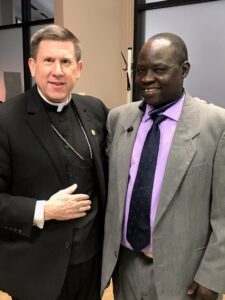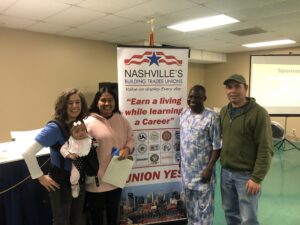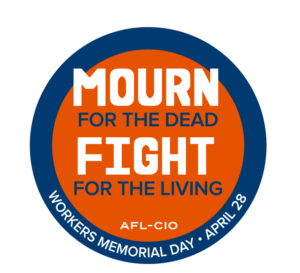A guest contribution from Rosemary Sokas, MD, MOH
As Catholics, we believe that working is a sacred act of co-creation. We believe in the intrinsic dignity of the person performing work. The covid-19 pandemic circles the globe like a crown of thorns, amplifying the need to put our beliefs into action.
First, it sickens and kills workers in sadly predictable ways. Frontline healthcare workers, first responders, nursing home and homecare workers – not to mention agricultural, food processing, transportation, grocery, pharmacy, and delivery workers — have all been asked to place their own lives and those of their families at risk. They and their families are dying.
Despite SARS, MERS, the H1N1 pandemic, Ebola and countless post-9/11 tabletop exercises, our just-in-time healthcare non-system, public health infrastructure, and basic labor laws have failed workers. Employers largely failed to provide the engineering, administrative and personal protective equipment (PPE) to protect workers – these differ by industry, but should have included basic hygiene measures, physical barriers, ventilation, and reusable as well as disposable forms of personal protective equipment that could have reduced the impact of shortages. What’s more, many have punished workers for speaking out and suspended them for bringing protective equipment from home. The Occupational Safety and Health Administration (OSHA) failed to implement even the most basic safety inspections until announcing a compliance directive on April 13, and still fails to enforce employers’ general duty to provide a workplace safe from infection to workers in non-health care facilities, despite thousands of worker complaints and worksites with hundreds of infected workers. The need for OSHA to enact an Emergency Temporary Standard has been widely noted, but that standard must address all workers deemed essential as well as all potential routes of exposure.
Many workers still lack paid sick leave and any form of job security. The most vulnerable earn poverty wages and lack health insurance. Hundreds of poultry and meat processing workers across Georgia, Virginia, Alabama, Tennessee, Colorado, South Dakota and elsewhere are infected and seeding outbreaks in rural areas. Farmworker and labor organizations are desperately petitioning federal agencies to improve work, housing, and transportation hygiene measures to protect the nation’s farmworkers, including H2A workers.
African American and Latino communities have been hardest hit, with death rates more than double that of the general population in those states and cities where demographic information is available; national data are missing. African American and Latino workers are disproportionately represented in the low-wage, high-risk jobs that have been deemed essential. On April 8, the Centers for Disease Control and Prevention (CDC) issued guidelines for “critical infrastructure” workers that, unfortunately, further increases the risk to these workers. The guidelines target, among others, workers in food preparation and agriculture. Despite abundant evidence of viral transmission from asymptomatic and pre-symptomatic individuals, CDC now recommends these exposed or infected workers be kept in the workforce, given masks, and told they “should maintain 6 feet and practice social distancing as work duties permit” (emphasis added). The document ignores family and co-worker concerns.
This failure to recognize that workers have intrinsic human worth beyond their functional utility is unacceptable. We need to protect the workers who provide essential services. This requires listening to workers to identify and address their concerns. The United Food and Commercial Workers (UFCW) union has communicated with its members, other workers and state governments, and negotiated approaches to protect workers and customers while helping to promote essential food production and distribution. Governors and mayors are listening – grocery workers are eligible for benefits provided to other essential workers in some states, and a number of cities and counties are requiring measures to reduce risks, including having customers wear masks. CDC would benefit from input from the front lines; giving worker representatives a seat at the table would be an important start.
What about those workers who have lost their jobs in the economic wake of the pandemic? Workers are struggling with an overwhelmed unemployment compensation system and many are dealing with the loss of their employer-funded health insurance. Despite Congressional efforts to improve unemployment benefits and to extend them to non-traditional workers, including the self-employed and gig workers, undocumented workers and others in the margins are eligible for none of this assistance. The long-term health consequences of involuntary job loss are sadly predictable as well. Risks include increased rates of heart attacks, strokes, all-cause mortality, substance abuse, mental health disorders, homicides and suicides. There is a better way. The short-time work program Germany and other E.U. countries use to reduce hours but prevent unemployment offers population health benefits that go beyond retention of health insurance and continued income support. German workers, classified as “not working” rather than “unemployed”, do not sustain the increased mortality seen among unemployed medium and low-skilled U.S. workers. We need to restructure our current approach to unemployment insurance to use funding to support continued employment.
Rosemary Sokas is professor of human science at Georgetown University’s School of Nursing and Health Studies and professor of family medicine at the School of Medicine, and previously served as Chief Medical Officer at OSHA and as Associate Director for Science at NIOSH.



